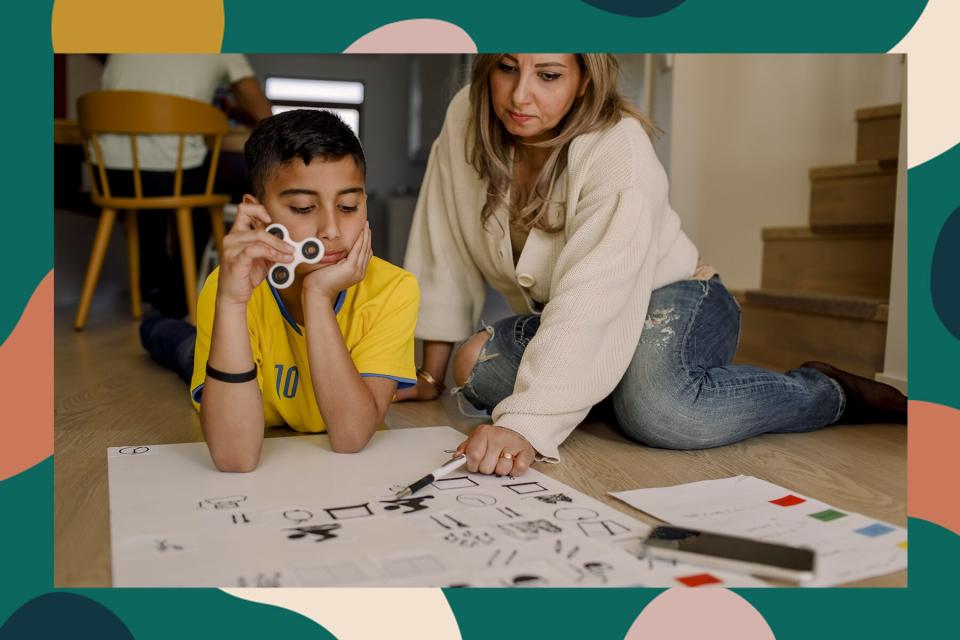My Kids Have ADHD and I Don't—And I Had to Learn How to Best Support Them

Getty Images
Motherhood—and mothers' voices—should be celebrated every day. But that also means having honest, judgement-free conversations about the complexities of parenting. In our series Millennial Moms, we reveal the beautiful—and daunting—responsibilities of motherhood through the lens of different women's experiences, from balancing side hustles in order to provide for our kids to dealing with dating apps as young single moms.
No one was particularly surprised when my daughter was diagnosed with ADHD at age four. She is a brilliant little thing, exceptionally gifted verbally, who cannot for the life of her, focus on her body and how it moves through space. As a baby, she took her first steps in the empty, recently drained bathtub and frequently climbed far too high in trees and on play structures. She lost her two front teeth in preschool because she got distracted while running through the park and slammed into a park bench. While she was previously diagnosed with a sensory processing disorder, I knew, because of my background in education and my own research, that the ADHD diagnosis was coming.
My son, at first, seemed so different from my daughter. He wasn't as active in his gross motor skills; he had fantastic object permanence. Once, when he was barely verbal, his shoe fell off in the grocery store and, when I noticed, he told me exactly where to find it. He was super emotionally tuned-in and snuggly and, just like his sister, was diagnosed with sensory processing disorder at age two.
As he screamed his way through the terrible twos into his third birthday, I began to see the ADHD symptoms show through.
He was a little bowling ball, throwing himself headfirst into us during playtime. He couldn't settle his body at naptime, causing chaos at daycare and in his bedroom at home. He got into things all the time and loved to climb the drawer handles to reach things on the shelves, causing me to babyproof more than I had to with my daughter. At four, he, too, got the ADHD diagnosis.
The thing is, I don't have ADHD. I certainly had my hyperactive moments as a child and am a highly sensitive person, but my brain works differently when it comes to focusing, prioritizing, triaging problems, and solving them. I do not procrastinate; I was too cautious and sedentary as a child (and adult), preferring to write in my journal or chat with friends than run around or play sports, and I frequently read novels in one sitting.
I hate to admit it, but I resent them sometimes, for not being able to do the things I can and could do. I want them to settle, to find stillness, peace, and their coloring book that's right there on their desk in front of their face. I want them to be successful at school, to hit their fine motor milestones, to control their impulses enough to keep them safe. But, they can't do that all the time.

Getty Images
They come from me, and they have a lot of me in them. Both my kids look just like me when they're mad or confused. Both my kids have my sensitive skin and sensitive feelings. I needed to give them grace.
So I began to find resources for my kids to help them. I realized they thrived in occupational therapy. They had Early Intervention services through the school district. We got a family therapist who also has ADHD. She told me that the biggest danger to kids with ADHD is not that they'll hurt themselves doing something impulsive, but it's the shame of always wanting to do the right thing and constantly disappointing the people around them—which would create life-long mental blocks for them. They might never feel good enough. They could feel ashamed of their behavior. They can act out and do things in secret so as not to be caught disappointing me and their other loved ones.
I didn't want that for them. I didn't want my kids to be ashamed of themselves.
So with the help of our family therapist, I started looking for opportunities to praise my kids. I told them how much I loved their strengths, like when my daughter cries for the dogs in TikTok videos. I told my son what a sweet, loving heart he has when he snuggles me when I'm having a hard day. When my daughter reads a difficult word or my son remembers all the lyrics to a song he heard once, I'm impressed and I tell them as much. You can see the pride on their little faces when I give them compliments and their behavior is more regulated after these moments.
I'm looking forward to finding all the creative, unexpected, quirky parts of my kids' personalities. I forgive them for forgetting their coats at places or needing to sing to themselves incessantly as we walk the dog. I forgive myself, too, for sometimes having a hard time parenting kids whose brains work so differently than mine. I do treat their ADHD and they do benefit from support, but what makes my kids' brains work the way they do is also something that contributes to how exceptional they are. The thing is, I wasn't a perfect child and I'm not a perfect parent, but when my kids are feeling good about themselves, it makes me feel like a more successful parent.


